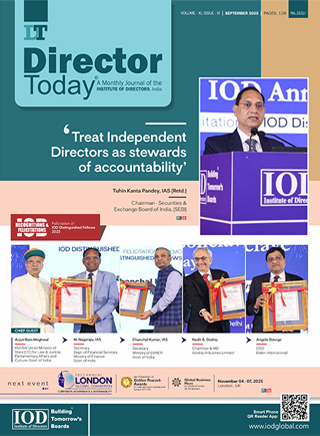The Boardroom Redefined Why Leadership Needs More Than Just a Title

As a woman who sits on the board of various companies, I have personally observed how corporate leadership has changed. Governance is no longer only about financial control; it is also about creating long-term value, encouraging ethical decision-making, and ensuring organizations are prepared to handle an increasingly complex environment.
Diversity in governance is a strategic necessity. Organizations that embrace diverse perspectives across gender, industry, and expertise tend to be more innovative, resilient, and better positioned for sustainable growth.
While there has been progress in increasing female representation, true impact comes not just from having a seat at the table, but from leveraging the unique strengths that women bring particularly, emotional intelligence and empathy.
Diversity in governance is a strategic necessity.
The role of a board member extends beyond financial oversight, it involves strategic thinking, an understanding of human motivations, and the ability to balance corporate interests with societal responsibilities. This is where women excel. Research has consistently shown that women's natural ability to lead with empathy allows them to collaborate more and consider a wide range of perspectives which might lead to more thoughtful and inclusive decision making.
Yet, one common misconception persists, that simply obtaining a certification in an independent board director program is enough to secure a board position.
The reality is that board members are expected to bring deep industry expertise and strong leadership experience.
Organizations should invest in women leaders at every level. This means creating mentorship opportunities, leadership programs, and sponsorship initiatives that empower women to move into executive and board positions.
Women seeking board roles must actively cultivate these skills, whether through executive leadership positions, financial training, or experience in strategic decision-making. Women must engage in industry forums, mentorship programs, and leadership networks to establish their presence in these decisionmaking circles.
To truly lead in governance, women need to believe in their experience. Women in leadership positions must be clear, precise, and confident in how they articulate ideas. Stereotypes won't disappear overnight, but the best way to break them is by proving, time and again, that our place in the boardroom isn't symbolic, it's strategic.

A truly effective boardroom thrives on diversity, not just in gender but in thought, industry experience, and leadership styles.
One of the biggest challenges in corporate governance today is the tendency to fast-track professionals into board roles based on narrow expertise in areas like sales or branding, without a much wider understanding of business. A truly effective board member needs several years of experience in leadership positions along with expertise in a few areas.
Board selection has traditionally prioritized prior MD/CEO experience. I believe that simply holding the top position doesn't mean someone fully understands board responsibilities.
Hence, people who have held leadership positions in areas such as audit, compliance, governance, customer service and HR can provide valuable insights. Having this experience helps in leading the board committee chair or as members while serving in a board position. As a committee chair, prior experience allows you to provide deeper insights, make informed decisions, and contribute more effectively to strategic discussions in a holistic way taking into account the softer and regulatory aspects of the land.
Moreover, recent experience is also important. Rather than focusing solely on individuals with extensive postretirement experience, we should consider those closer to retirement or newly retired for board positions. This ensures clarity on evolving regulations and laws, which are constantly changing.
Having a recent understanding of business operations and exposure to diverse industries also adds immense value. It brings perspectives that organizations may not have considered. For example, in consumer businesses, success depends on retail operations, securing funding, and managing working capital. Someone with both banking and retail experience will likely find execution much easier than someone with a narrower industry background.
To foster the growth of future board directors, organizations should proactively champion leadership development, mentorship, and succession planning. This ensures that individuals from diverse backgrounds are equipped for executive and board roles.
In my case, I have experience handling branding, building businesses, CSR and HR domains in a regulated environment. So, I bring my experience working for these different verticals into the mix.
Moreover, being from a highly regulated industry, we are trained to handle and understand the core nuances of different businesses.
In my journey as a board member, I have realised that every board decision should be grounded in four key principles. The first is the share holder's interest which means making decisions that can create long term value and align with industry standards. The second is the impact on the community. It is about recognizing that businesses have responsibilities beyond profits and should drive positive social change. The third aspect is employee well-being and making sure employees are engaged, diverse and motivated. The fourth element is all about customer experience and delivering products and services that truly meet the needs of the company's consumers. While these four aspects are important, the decisions must be aligned with corporate ethics and legal compliance. A decision that doesn't hold up in these areas isn't a decision worth making.
Women in leadership positions must be clear, precise, and confident in how they articulate ideas.
The best way to make an impact in the boardroom is through fact-based, well-reasoned decision-making.
To conclude, biases against women directors still exist. But the strongest way to counter them is with competence. Women don't just need to take a seat at the table, we need to bring something valuable to that table. And that means being prepared, being data-driven, and making recommendations that are impossible to ignore.
Governance is not just about holding a position; it is about shaping the future of business. The strongest, most diverse voices must be at the table, ensuring that the decisions made today create a better tomorrow.
The modern business environment demands a new kind of boardroom leadership, one that is adaptable, inclusive, and forward-thinking.
Author

Ms. Shanta Vallury Gandhi
Sr. Business Leader
Independent Board Member
(NSDL Payments Bank Ltd.,
TMI Group, et al.)
She is a seasoned business leader and Board Member at NSDL Payments Bank Limited, TMI Group, Ghodawat Consumer Limited, Agarsha Senior Care Private Limited, among others. She brings over three decades of experience in banking and financial services. Moreover, being from a regulated industry, She handles the core nuances of different businesses, keeping the context relevant by ensuring compliance, auditable processes, and overall governance in decision-making.
Her expertise spans retail assets, financial product distribution, human resources, and internal branding. With a proven track record in organizational transformation and people leadership, she has successfully driven sustainable growth. A strong advocate for DEI, she is committed to fostering impactful CSR initiatives that create meaningful change.
Owned by: Institute of Directors, India
Disclaimer: The opinions expressed in the articles/ stories are the personal opinions of the author. IOD/ Editor is not responsible for the accuracy, completeness, suitability, or validity of any information in those articles. The information, facts or opinions expressed in the articles/ speeches do not reflect the views of IOD/ Editor and IOD/ Editor does not assume any responsibility or liability for the same.

 Quick Links
Quick Links
 Connect us
Connect us




 Back to Home
Back to Home































